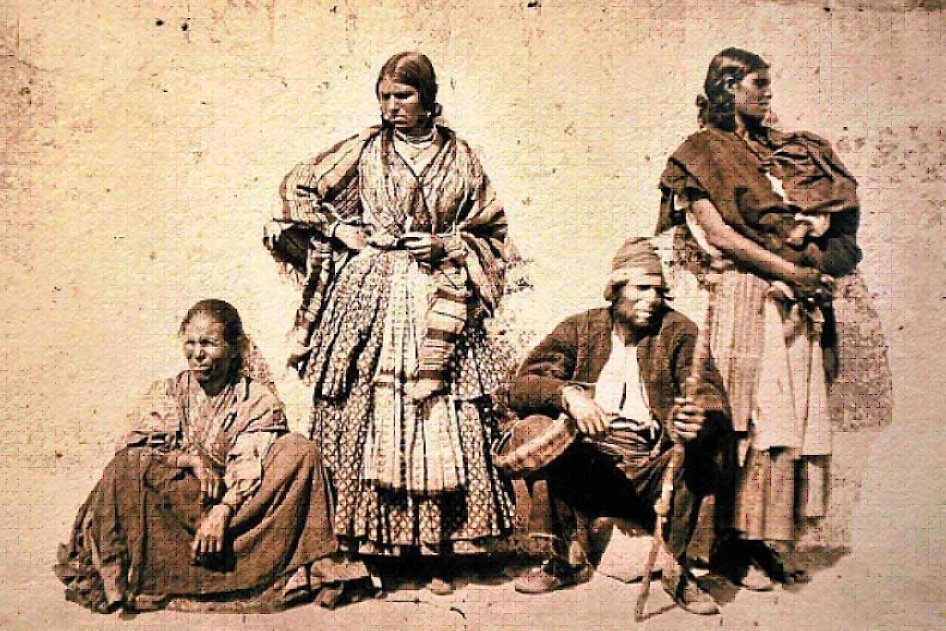The origin of the gypsies
All we know about the gypsy ethnicity is that it has suffered and suffers from severe discrimination and that it has no country or territory of its own. But, of course, it was not always that way. So what is the origin of the gypsies?

Whether as merchants or as protagonists of various shows, the gypsies have traveled the world for centuries in search of a home, and their origin has been the object of all sorts of fantasies: they have been considered descendants of Cain, or related to The strain of Cam. Some traditions have identified them with Chaldean magicians from Syria, or with a tribe of Israel lost in Pharaonic Egypt. It has also been said that they belong to the Antarctic, a legendary island of spectacular dimensions that "existed" nine thousand years ago.
The origin of the gypsies
The word gitano derives from the word "Egypt". And is that it was believed that the gypsies were originally from Egypt, because they came to the peninsula from this country and also had "dark skin." However, research by geneticists, linguists and anthropologists has confirmed that the starting point of the long journey of the gypsy people is in India.
The study of the language of the gypsies, the Roma, confirmed that it was an Indian language, very similar to Panyabi or Western Hindi. The traces left by this language have allowed to draw a linguistic map that reveals the extensive route of the gypsy town. In this way, the origin of the gypsy people has been located in the northwest of India, in the present border between India and Pakistan (state of Rayastán). This linguistic discovery has been supported by genetic studies. In addition, several towns whose dances are very similar to flamenco, live today in the Indian state of Rayastán.
Their journey around the world
It is accepted by most investigators that the "roms" could have left India around the year 1000, traversing what is now Afghanistan, Iran, Armenia and Turkey.
Part of the history and culture of this ethnic group, including the reason they migrated from India and the social status they occupied at the time, remains a mystery. Some theories suggest that they were originally individuals belonging to an inferior caste (called "the untouchables"), recruited and sent to fight to the west against Muslim invasion. Or perhaps the Muslims themselves conquered their territory, enslaved them and brought them west, where they formed a separate community. Why the gypsies chose to continue traveling west instead of returning to their land is another enigma.

In the fifteenth century, because of the incessant wars between Byzantines and Tartars and Turks, the gypsies began a new migration. Its first important stop was registered in Greece, in the port of Modon, also known as "little Egypt". Their journey continued through Central Europe, where the King of Bohemia (old reign of central Europe) gave them protection and protection. Hence they are also called "bohemian".
The fifteenth century can be considered as the golden age of gypsies in Europe since, although it was true that they were often expelled, prejudices about their way of life were not yet ingrained. The first gypsies who arrived in Europe wandered from country to country, telling the most extraordinary and mysterious stories about their origin (something that has incited many legends and fantasies about the origin of the gypsies). The inhabitants listened among fascinated and distrustful to those travelers of exotic clothing full of experiences. And so, between curiosity, hostility and fascination, Gypsy culture spread throughout the continent, mixing with local cultures and languages.
Later, when curiosity for the unknown disappeared, discrimination began. Most people considered them to be invaders and criminals, and slowly they became a challenge for the established powers, for the sedentary population and for the dominant religion. In the sixteenth century persecutions and punishments began. In this way, in search of a territory where they were respected and welcomed, they traveled throughout Europe. And so to this day.
But despite all the persecutions and genocides suffered for centuries, the essence of Gypsy culture still remains, that spontaneous and natural way of living life. In addition, despite the geographical and cultural dispersion of so many different nationalities, Roma have a common identity: the Roma language and an ancestral lifestyle based on tradition, family ties and group cohesion. And is that the gypsies are, in short, a cultural nation or stateless nation.
An example of the undoubted common identity of the gypsies is the use of the word "payo", with which they designate those who are not gypsies. It is believed that the word "payo" has its origin in the Catalan term "pagès" ("payés"). The Catalan peasants were the first local inhabitants that the gypsy town found when it arrived at the peninsula. This would explain why newcomers began calling "non-gypsies" "payos".
On the other hand, the "payos" have incorporated great amount of words that have their origin in the Iberian Romani dialect, the caló, like "chaval", "chungo", "currar" and "churumbel".
References:
Union Romani

Very interesting!